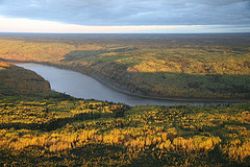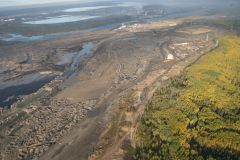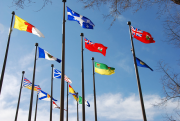Grassroots campaigning is not something that comes naturally to us here at the Pembina Institute. As a leading Canadian think-and-do tank working to make our energy systems cleaner and more sustainable, we’re known for our high-calibre policy research, our facts-based advocacy and our innovative consulting work. Pembina’s engineers, scientists and policy analysts are most comfortable working behind-the-scenes to ensure Canada has the best policy and technological expertise to draw on when making decisions about our energy future.
We prefer research over rhetoric, and pragmatic policy solutions over posturing and political theatre. But the level of public discourse over energy issues and environmental protection in this country has sunk so low over the past few months — with accusations, counter-accusations, slander, hyperbole and hysteria often taking the place of reasoned debate — that even Canadians who are well informed about energy issues have just cause to wonder who to believe.
Why we’re speaking out
The Harper government’s ongoing campaign to discredit environmental groups and charities shows it’s going to take a significant and united effort to return to a constructive and much-needed public discussion around Canada’s energy future.
Recently the Pembina Institute joined forces with many of Canada’s top environmental organizations to launch Black Out Speak Out (or Silence, On Parle in French). Between now and June 4, we invite Canadians concerned about the Harper government’s efforts to weaken environmental laws and block public participation in decisions that put our land, air, water and climate at risk to join us in speaking out in defence of nature and democracy.
While the government has downplayed the significance of its plans to weaken Canada’s environmental laws, a close reading of Bill C-38 (the federal budget implementation bill that contains the proposed changes) tells a different story.
Through Bill C-38, the Harper government will repeal the Canadian Environmental Assessment Act, and replace it with a new law that allows cabinet to override the decisions of the supposedly arms-length National Energy Board, fast-track environmental reviews to speed up approvals of infrastructure projects and dramatically narrow the definition of ‘environmental effects’ to be considered in environmental reviews.
The net result is weaker standards for environmental review across the country and a reliance on a patchwork of less comprehensive provincial assessment laws. In other words: a huge setback for environmental protection.
 It doesn’t stop there. Changes to the federal Fisheries Act would severely undermine protection for fish and the waters they live in. Not only do the changes narrow protection to fish licensed in commercial, recreational or aboriginal fisheries — leaving many lakes, rivers and streams vulnerable — they also give the minister of fisheries and oceans (or any person or entity delegated by the federal government, including industry, developers and the provinces) expanded authority to allow harm to fish habitat.
It doesn’t stop there. Changes to the federal Fisheries Act would severely undermine protection for fish and the waters they live in. Not only do the changes narrow protection to fish licensed in commercial, recreational or aboriginal fisheries — leaving many lakes, rivers and streams vulnerable — they also give the minister of fisheries and oceans (or any person or entity delegated by the federal government, including industry, developers and the provinces) expanded authority to allow harm to fish habitat.
The bill also changes the definition of what constitutes serious harm to fish; the proposed changes would only prohibit permanent alteration or destruction of fish habitat, whereas the current law protects against any “harmful alteration or destruction” of habitat.
Through Bill C-38, the Harper government has introduced measures that could limit citizen groups and research organizations like the Pembina Institute from participating in environmental reviews and could restrict the funding and activities of charities that advocate for better laws and policies. The proposed bill also eliminates the independent government agency analyzing solutions to meet our international commitments to reduce greenhouse gas emissions, and strips accountability and transparency from federal climate policies.
The absurdity of the Harper government’s heavy-handed approach
 Given the breadth and scope of the proposed changes, the Harper government is clearly doing more than simply cutting unnecessary red tape — it’s doing its utmost to accelerate Western Canada’s mining and energy industries, and in particular Alberta’s oilsands development.
Given the breadth and scope of the proposed changes, the Harper government is clearly doing more than simply cutting unnecessary red tape — it’s doing its utmost to accelerate Western Canada’s mining and energy industries, and in particular Alberta’s oilsands development.
This is absurd for three reasons: one, Canada’s energy industry is already operating on overdrive, short of labour and infrastructure and having a tough time keeping up with the current pace of development. Two, while Ottawa says it’s making these changes to move important infrastructure projects like oilsands pipelines ahead, it risks undoing any progress Alberta and the energy sector has made in improving the energy sector’s tarnished reputation by taking such a heavy-handed approach on the environment. Finally, the government’s aggressive attacks on environmental advocates may very well erode the public’s trust in government and large companies seeking a social license to operate, at a time when — as with the Northern Gateway pipeline — social license does not come easily.
The Pembina Institute thinks that the time has come for Canadians everywhere who are concerned about our natural environment and the state of our democracy to speak out. Please join us and spread the word among your friends, family and colleagues and in your communities.
On this one, folks, silence is not an option.










